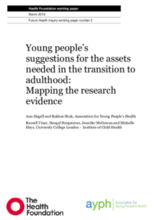Abstract
The Health Foundation launched its Young people’s future health inquiry in 2017, a firstof-its-kind research and engagement project that aimed to build an understanding of the influences affecting the future health of young people. At the beginning of the inquiry young people were consulted to reflect on what they felt were the most important factors in supporting a successful transition into adulthood, in their early 20s. They identified four key assets. In this paper, we explored the extent to which the existing research literature had addressed each of the assets, and if so, what it showed about the asset’s role in a transition to adulthood.
The four key assets the young people had identified were:
- Skills and qualifications: ‘How right my skills are for the career I want’. Existing research evidence confirmed that not having the right skills for employment is an increasing concern both for employers and for young people in the changing labour market. Issues included acquisition of minimal qualifications, suitability of qualifications for modern work, and risks posed both by under- and over-qualification. Plenty of evidence supports the importance of educational level to later health outcomes, but the implications of a skills mismatch at work are less clear.
- Personal connections – access to relevant connections and social networks: ‘The confidence and connections to navigate the adult world’. Research evidence confirms the importance of social networks, personal connections and neighbourhood resources in setting the context for the transition to adulthood. The relationship between social capital and health outcomes is also supported.
- Financial and practical support: ‘Having the support to achieve what I want from life’. Despite there being evidence on the importance of financial and practical assistance in improving education outcomes and socio-economic status for young people, research on the direct impact on their health outcomes in early adulthood is limited.
- Emotional support: ‘People I can lean on emotionally’. Research confirms friends, family and romantic partners are critically important to young people’s sense of wellbeing and connectedness. However, most of the research is set within the context of mental health problems, development of self-esteem, identity development and the role of peers in helping each other to manage situations such as college. There was little research on how emotional support can help emerging adults achieve their life goals or lead to better health outcomes.
Overall, this review suggested that the research literature has not paid as much attention to the transition to adulthood compared with experiences during the teenage years. Although all four of these areas receive a certain amount of research support in terms of their role in helping young people navigate their early 20s, the evidence is not definitive and the approaches taken to date have not been as nuanced and holistic as the model the young people proposed themselves. The young people in the Health Foundation’s future health inquiry have given us a set of plausible and legitimate hypotheses, and the next stage will be to further test these ideas in the quantitative data sets available to us.

